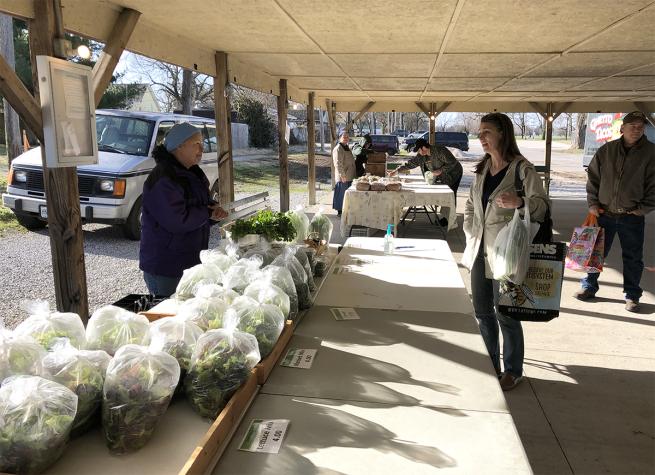COLUMBIA, Mo. – As summer approaches, Missouri’s estimated 240 farmers markets are struggling with how they will comply with COVID-19-related restrictions. Regarded by many as vital and vibrant community hubs, farmers markets will need to rethink how to work with their vendors and still serve a public hungry for locally grown food.
“Farmers markets represent a big part of Missouri’s entrepreneurial presence,” said Maria Rodriguez-Alcalá, county engagement specialist in community economic development in Jasper County. “This is an opportunity — forced of necessity — for markets and vendors to find different ways to continue to share their resources.”
To help with that transition, MU Extension hosted a discussion April 8, via Zoom. “Innovative Ideas During COVID-19: Three Farmers Markets in Missouri Share Their Stories” featured representatives from three year-round markets:
- Rachael Lynch, manager, Webb City Farmers Market.
- Corrina Smith, manager, Columbia Farmers Market.
- Karissa Kary, executive director, and Jesse Stone, manager, Farmers Markets of the Ozarks.
A panel of faculty from MU Extension and the MU College of Agriculture, Food and Natural Resources (CAFNR) co-hosted the session and shared resources, said Bill McKelvey, senior project coordinator with CAFNR’s food systems initiatives.
“Commercial horticulture specialists around the state — including Debi Kelly in the St. Louis area and Rob Balek, Patrick Byers and Kelly McGowan in the southwest region – have been working hard with the markets in their region to help them during this transition,” Rodriguez-Alcalá said. “This discussion was a way of bringing all of that knowledge together.”
The resources couldn’t come at a better time, said Eileen Nichols, founder of the Webb City Farmers Market, now in its 21st season. The year-round market initially struggled to meet rapidly changing restrictions and has learned a lot through trial and error. Now the focus is exclusively on food sales, with some of that moving to an online ordering system.
With the blessing of the city and local health department, the market continues a robust business, with sales at least even with the same time last year, and serves 2,000 weekend “grab and go” meals to schoolchildren. “We’re still providing fresh, local, nutritious food to our community,” Nichols said. “This experience has reinforced to us that the primary reason customers come to the market is to buy fresh food from local farmers. That’s something we can still do.”
On a national level, Sarah Low, MU associate professor of regional economics, helped prepare a brief on behalf of the National Sustainable Agriculture Coalition, providing an estimate of the economic impact of COVID-19 on local and regional foods from March through May. The information contributed to Congress including $9.5 billion in the Coronavirus Aid, Relief, and Economic Security (CARES) Act for producers, including those selling food through local and regional food markets, Low said. While not all the money will go to local producers, this was a big win.
Coincidentally, Low recently published an MU Extension guide on online sales as a marketing opportunity for rural farms. “Could Online Sales Be a Direct Marketing Opportunity for Rural Farms?” is available for free download at extension.missouri.edu/publications/g6224.
MU Extension hosted a second COVID-19 Zoom roundtable, Innovative Ideas Emerging Among Farmers Markets in Missouri, on April 30.
For more information
• COVID-19 resources for Missouri farmers markets, part 1:
extensiondata.missouri.edu/NewsAdmin/Photos/2020/MUExtension_FrmrsMkt_Handout_4.8.2020.pdf.
• COVID-19 resources for Missouri farmers markets, part 2:
extensiondata.missouri.edu/NewsAdmin/Photos/2020/MUExtension_COVID19_SmllFrmsMktPanel_Apr30_2020_Handout.pdf.
• Missouri Department of Health and Senior Services COVID-19 guidance for farmers markets:
health.mo.gov/living/healthcondiseases/communicable/novel-coronavirus/pdf/farmers-markets.pdf.
• Missouri Department of Agriculture COVID-19 resources:
agriculture.mo.gov/emergency/covid-19.
Writer: Katherine Foran
